#their friendship can be categorized as stubborn fools who help each other before they help themselves
Explore tagged Tumblr posts
Text

And a fun little pose from my last line challenge post of how the first meeting ends - with Lahabrea carrying a very sheepish Sinoe to the Words of Emmerololth for healing.
I was half-asleep when I was attempting this and used the wrong Lahabrea model. It should have been the younger one because they met a bit before he self-sundered. Oops!
#ffxiv#lahabrea#azem#lahazem#oc: sinoe#their friendship can be categorized as stubborn fools who help each other before they help themselves#if Sinoe returned to Amaurot in rough shape he always made sure they were taken to a healer#and Sinoe tried to make sure he didn't overwork himself
2 notes
·
View notes
Text
Film Essay: STAND BY ME

(WARNING: spoilers ahead!)
In their book Screening Scripture: Intertextual Connections Between Scripture and Film, George Aichele and Richard G. Walsh explain the meaning to come of age as "a delicate mixture of rebellion, assistance, discovery and accommodation." Fundamental in many narrative stories, coming-of-age films follow characters that undertake a rite of passage to find a new sense within themselves. This transitions them into maturity, bestowing a vast sense of their own individuality and direction in life they, at first, thought impractical.
Often, in the course of a coming-of-age film, the protagonist or protagonists—often precocious beyond their years—accept the quest from their struggle to claim an identity outside of their social norms, outside of their own family or community. Examples of reasons for the protagonist to progress would be an event, a traumatic loss, banishment, escape, or battling against their own internal and external obstacles in their normal environment. Coming-of-age films revolve around a young persons’ desire to find their own honesty as individuals, previously unchallenged before they embarked on their personal journey.
Jule Selbo’s Film Genre for the Screenwriter categorizes the genre with different age groups: pre-teen (12 or younger), teen/adolescence (13-19) and pre-adolescence (20 and over). Selbo also states an undocumented detail that young audience members prefer coming-of-age films where “the protagonist is a few years older than the viewer,” allowing them the opportunity to alter their vision of the future from the character’s pedagogical objective. Thereby, much like the central character (or characters), the journey shapes and molds them with a keen perspective on reality after viewing. The specific knowledge gained from the genre, where the film allows itself to gain access to “memories of insecurity, immature behavior, stubbornness in the face of change,” and similar emotions invoke reality, which, if successful, resonates with observers.

Set in the small town of Castle Rock, Oregon, in the summer of 1959, Rob Reiner’s Stand By Me adheres to the pre-teen age group of coming-of-age films. These focus on friendship and teamwork to further understand the adult world. A quartet of twelve-year old boys embark on an overnight camping trip to find the dead body of Ray Brower—a boy about their age—in order to claim his body and better their reputations with acclaim and publicity, with thoughts of their faces featured on television or a newspaper.
Told through flashback by Gordie LaChance (Wil Wheaton) as an adult (Richard Dreyfus), his other friends are Chris Chambers (River Phoenix), the tough leader of their gang and part of a bad family scorned by the community, including his alcoholic father and his other hoodlum brother Eyeball. Teddy Duchamp (Corey Feldman) is the disturbed, bespectacled member of the group, with a father given to psychotic fits of rage; in one particular incident, he held his son’s ear to a stove, almost burning it off. The chubby and pathetic Vern is always the target of their jokes, due to his timid nature and peculiar behavior.
The train tracks that lead the characters further to Ray Brower’s corpse builds on character growth throughout much of the film. Reiner and the child actors showcase a sense of camaraderie among the four boys, including frequent displays of childish behavior, given their age. Of course, the drawback to this behavior is an inability to cope with their central problems in a mature way. The train tracks may provide the way forward, but carries danger when speeding locomotives make their route. In one scene, Teddy stands on the tracks, wanting to dodge the train as it travels in front of him. In his mind, he is a soldier centered at the beach of Normandy, where he claims his father fought during World War II. Teddy still stands, with his sleeping pack adjusted like a machine gun, as the train draws closer. Chris grabs and takes him off the tracks, since Teddy’s intentions might have been suicidal instead of playful. His indignant response to Chris after being saved: “I don’t need no babysitter.”
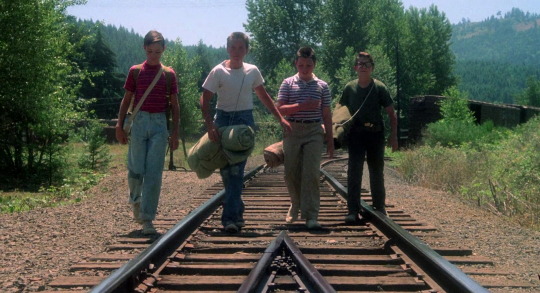

The boys pursue the quest to find Dan Brower’s body not only to appear heroic, but also to emerge brave men in the eyes of their community. Gordie has the benefit of the American middle-class, it is not ideal as one would hope. The sensitive Gordie is the “invisible boy” in his own home, even more so after his older brother Dennie’s death from a Jeep accident. Shown in the young Gordie’s memories, his brother was considerate and encouraging towards him than his parents, especially his domineering father. In the two scenes with the brothers together, Dennie gives Gordie his Yankees baseball cap and praises a story he had written while their father chooses to keep the subject of Dennie’s all-star football match at the dinner table. Evidently, Gordie bears a resemblance to his brother, according to a store clerk he encounters while purchasing food for the trip.
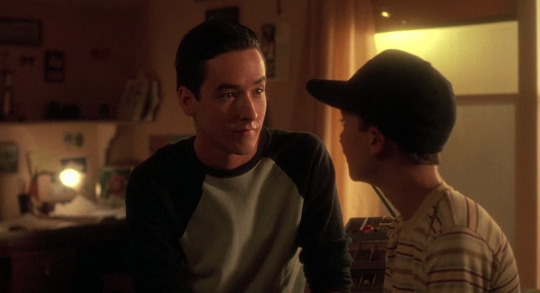
Gordie providing the food for the group alludes to the boys’ maturity, as well. Though they want to gain a newfound wisdom after they find Ray Brower’s corpse, the boys still lack basic judgment. They forget to pack food for their excursion and have to contribute pocket change to survive, which comes to a paltry $2.37, with Vern having only seven cents. In another instance of youthful naïveté, a farfetched urban legend about the vicious junkyard dog Chopper—reputable for attacking specific parts of the male anatomy—also confirms their simplicity consistent within their age group. This legend is debunked when it is seems Chopper is only a small golden retriever. In one scene, their boyish innocence in an age where early stages of puberty loom over them, indicative when they mention Annette Funicello’s increasing breast size on The Mickey Mouse Club.
In one exchange between Gordie and his father, he tells his son that he does not approve of his friends, which he deems “a thief [Chris] and two feebs [Teddy and Vern].” His father’s denigration towards them dooms him, but it provides a springboard from his father’s all-American standards, since Gordie’s friends do not possess the machismo or intellectual as his older brother’s. The emotional layers within the characters that permeate the film are quite evident. Teddy emulates the valiant military soldier in his father, through ersatz battle cries and machine gun fire. The fact that he endured his abuse does not matter to him; what he sees in his eyes is a true man who withstood combat. Chris has committed petty crimes, but he does not want to share the notoriety his family is known for at Castle Rock. He becomes a victim of prejudice when he returns milk money he had stolen from school to one of his teachers. However, the money had not been returned, resulting in a three-day suspension for Chris, all because the teacher stole it back to buy a new dress.
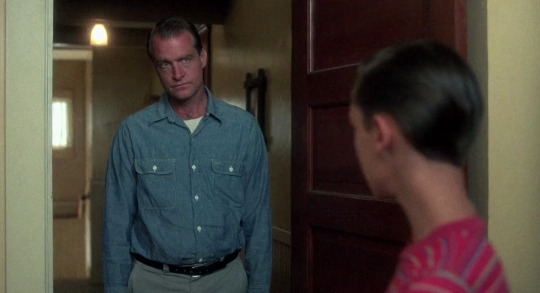
In their writings of coming-of-age films, George Aichele and Richard G. Walsh state that often in this genre, when a protagonist chooses to separate from their home and community, they journey along and conquer obstacles with the help of a friend that serves as a guide. In a scene that separates the boys into two separate groups along the train tracks, there is an implication that Gordie has a worldly skill to become successful in the future, but not as bright for the other three, obstructed by their idiosyncrasies. Stand By Me takes place shortly before the new school year, and the boys are each defined by the “shop” and “college” courses they will enroll. Whatever Chris believes that Gordie will befriend better classmates, while the rest will be “with the rest of the retards, making ashtrays and birdhouses.” To Chris, if Gordie remains with the gang, he will not become successful as a writer. However, Gordie’s lingering thoughts over his father’s harsh opinions—not explicitly present in the film—make him doubtful about these notions and does not wish to leave his friends.
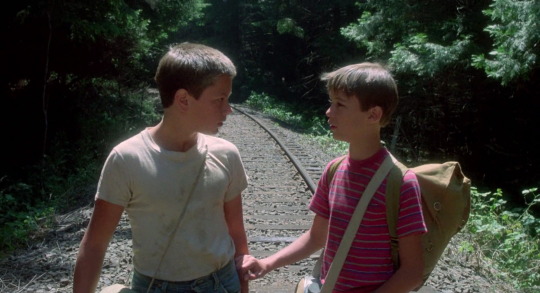
As their journey grows precarious, the sooner their relationship wanes. Gordie spends a moment of solitude away from his friends, when he makes eye contact with a deer on the train tracks. To him, this is more significant than the usual horseplay he participates in with his friends. His communication with nature reflects how Gordie had felt alone, having lost his brother and raised by an unappreciative family, but if the deer is able to adapt to its surroundings and survive on its own, so can he. However, after the group moves forward across a deep pond, they fool around and dunk each other before they find leeches on their bodies. After evacuating from the water, Gordie faints after finding a leech in his private region. The gang has second thoughts about continuing their journey but Gordie wants to move forward. The narrator implies he would have wanted to travel alone and focus on the task, and not engage in immature antics any longer.
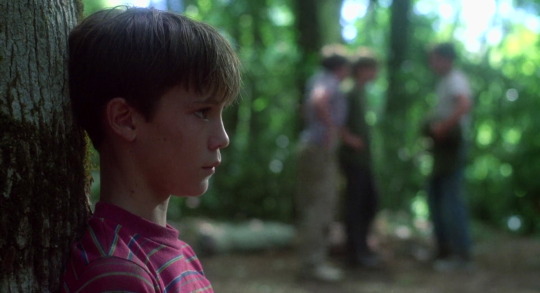
In an age where life demands Gordie and his friends to make decisions about expectations in education, Ray Brower’s corpse is the transition into their teenage years before they arrive back at school. The store clerk mentions a quote from the Bible that acknowledges mortality: “In the midst of life, we are in death.” Though the boys are able to enjoy life’s pleasures, they should not take full advantage of them. When Gordie sees the body, he sobs, wondering why Dennie had died and left him with an ungracious family, stemmed from a nightmare that occurs earlier in the film. In the dream, Dennie’s casket lowers underground, and Gordie’s father turns to his other son and states that it should have been Gordie who died. Meanwhile, rival hoodlums older than the boys, with Chris’ brother Eyeball among them, decide to claim the body and threaten to kill them if they interfere. Like Gordie and his friends, publicity is their gain.

Earlier in the film, a part of Gordie’s deceased brother is desecrated when Eyeball snatches his baseball cap back home. When Ace (the leader of the group) attacks Chris, Gordie commits his own righteous act by pointing at Ace with a .45 caliber handgun he brought along. His retribution has a dual purpose—Gordie refuses to have his memories stripped away and perhaps, a change of heart over Ray Brower’s corpse. Ace and his gang leave, and the boys decide not to claim the body, leaving behind the accolades they yearned throughout their entire trip. When they travel back home, they barely speak to each other, their lives restricted and their town of Castle Rock smaller and different from when they left.

Life, especially childhood, is short. In a coming-of-age film, if the protagonist has a friend that serves as a guide, after the obstacles they have withstood, they at least consider their advice. Gordie becomes a writer, obviously encouraged by Chris, and this story serves as his latest written work in progress. He reveals that he had not seen the rest of the gang in years, but he reveals their futures ahead of them, as they wave their farewells to each other and fade away. Vern is a married man with four children, working as a forklift operator in a lumberyard. Teddy’s deformed ear and poor eyesight led to his rejection from the Army, and has spent time in prison, leading to low-level odd jobs around Castle Rock. Chris enrolled in the college courses with Gordie and became a lawyer before he is stabbed to death in a fast-food restaurant. His last sentence he writes on his computer sends the message further: “I never had any friends later on like the ones I had when I was twelve. Jesus, does anybody?”
Director Rob Reiner spoke about his interpretation on the film’s meaning and stated: “It was all about the beginnings of learning to like yourself, beginning to accept yourself, with the help of good friends who could help you validate yourself by seeing what was good in you.”

191 notes
·
View notes